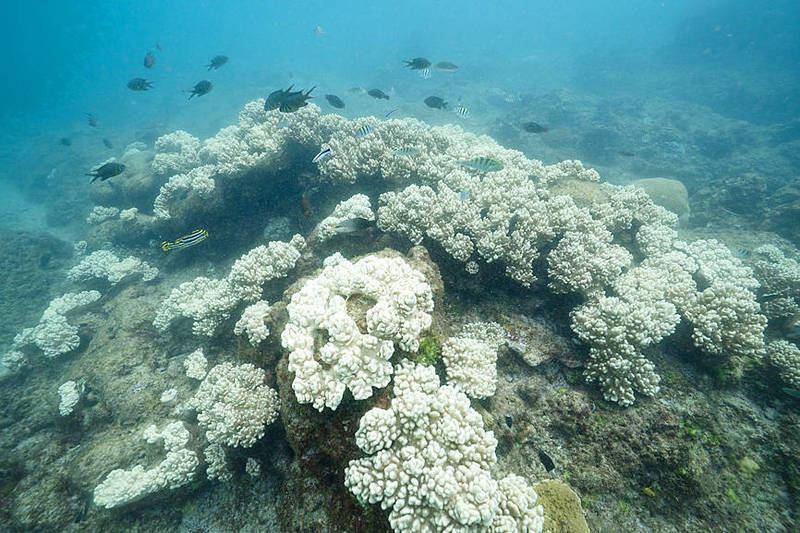《TAIPEI TIMES》 Hypoxia threatening coral in tropical seas: study

Bleached coral is pictured in the waters around Siaoliouciou Island in an undated photograph. Photo courtesy of Su Huai
MODERATE TO SEVERE: Local researchers involved in the global study found that five coral reefs near the Pratas Islands and Itu Aba Island all had low levels of oxygen
By Wu Po-hsuan and William Hetherington / Staff reporter, with staff writer
Increasing occurrences of hypoxia, or low levels of oxygen in a body of water, are threatening coral in tropical environments, a research paper that a Taiwanese research team contributed to said.
The paper, titled “Increasing hypoxia on global coral reefs under ocean warming,” was published on Thursday on the online journal Nature Climate Change, detailing the results of a study led by the Scripps Institution of Oceanography at the University of California, San Diego.
Chou Wen-chen (周文臣), a professor at National Taiwan Ocean University’ Institute of Marine Environment and Ecology who contributed to the paper, on Saturday said that in the past, hypoxia mostly occurred in temperate seas, but the phenomenon is now being observed in tropical waters.
Chou’s team found that five coral reef ecosystems near Taiwan’s Pratas Islands (Dongsha Islands, 東沙群島) and Itu Aba Island (Taiping Island, 太平島) are all in a state of moderate to severe hypoxia.
Teams from Taiwan, Japan, Panama, Puerto Rico and the US studied 32 coral reefs in 12 locations worldwide, observing day-night changes in oxygen levels in the seawater.
“The study clearly reveals that global warming not only aggravates the bleaching of corals and the acidification of oceans due to the increase in dissolved carbon dioxide, but also worsens hypoxia,” Chou said.
The teams used the four climate change scenario models proposed by the UN Intergovernmental Panel on Climate Change (IPCC) to predict how dissolved oxygen levels change due to climate change, he said.
The study showed that by the year 2100, the temperature rise would cause oxygen solubility to decrease, and the oxygen consumption rate of coral’s biological metabolism to increase, which would greatly worsen hypoxia in coral reef ecosystems, Chou said.
However, Huang Wei-jen (黃蔚人), an associate professor at National Sun Yat-sen University’s College of Marine Sciences, said that hypoxia cannot be explained by one factor.
“It is necessary to understand the relationship between hypoxia and other factors, such as rising sea temperatures, accelerated respiration and coastal eutrophication,” he said.
Scientists are looking at ways to stave off bleaching by studying high-temperature-resistant corals, but this would not solve the problem of hypoxia, said Chen Chao-lun (陳昭倫), an associate researcher at Academia Sinica’s Biodiversity Research Center.
“A comprehensive study of what causes bleaching is needed to deal with future changes,” Chen said, adding that the research published on Thursday was the first to study coral reefs in different seas simultaneously, and to confirm hypoxia on a global scale.
The study found that more than 97 percent of the sampling points were in varying degrees of hypoxia, of which 13 percent were severely hypoxic, he said, adding that the points measured near the Pratas Islands and Itu Aba were among the most severely hypoxic samples.
“Under the scenario of extremely high emissions estimated by the IPCC, the number of coral reefs in environments with very low oxygen levels will nearly triple by the end of this century,” Chen said.
Most research focuses on hypoxia in temperate climates, and for organisms that dwell on the ocean floor, he said.
“Also, this study looks at the impact of hypoxia on individual organisms. Whether climate change or increased carbon dioxide emissions increase the impact of hypoxia on the overall coral reef ecosystem requires more research,” he said.
The ocean absorbs a large amount of heat produced by global warming, and dissolves a large amount of carbon dioxide, increasing the possibility of algal blooms, which increase the occurrence of hypoxia in coral reefs, he said.
It is also necessary to avoid polluting the habitats of marine organisms, which could worsen hypoxia through eutrophication, National Museum of Marine Biology and Aquarium researcher Tang Chuan-ho (唐川禾) said.
新聞來源:TAIPEI TIMES


















